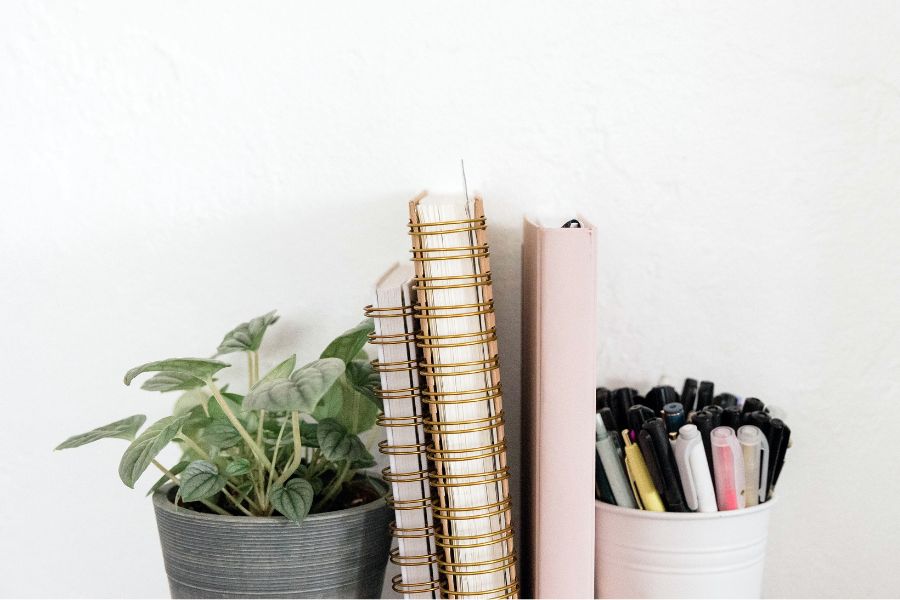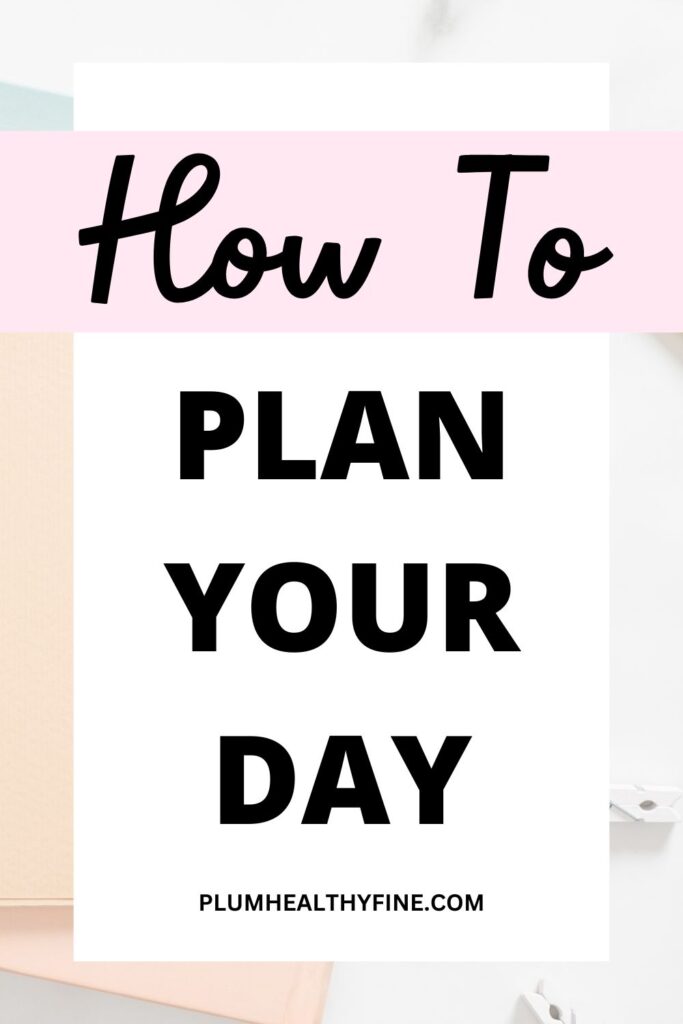Do you often find yourself overwhelmed by the demands of the day, struggling to accomplish everything you set out to do?
Here are 8 ways to plan your day and master the art of daily planning with ease.

One of my favorite quotes of all time is “If you fail to plan, you plan to fail.”
Sure, going with the flow and taking things as they come have their own merits.
But in a world where stress and hustling are considered “good” (eye roll), those who command their time are the ones who can reclaim their right to be stress-free.
The beauty of planning and organizing ahead of time is that you get to pick how crazy and deep you want to go with it.
I know some people who plan their whole week and month in advance.
Then there are some peeps who have the entire year mapped out on their calendars and bulky planners.
But the most basic level of planning, which I think is a must for everyone, is daily planning.
It is the one habit I stick to no matter what because it helps me in every freaking area of my life — from running this blog to following a good exercise routine.
In this post, I’ll share all the straightforward tips that make it possible for me to plan my day effortlessly.

Here are 8 smart ways to plan your day without stressing about it:
8 Awesome Tips For Planning Your Day
1. Start With A Clear Vision
Begin your morning by visualizing your day. Give your mind a clear vision of what you want your day to look like.
Ask yourself: What are the things I want to achieve today? What do I want the theme of my day to be? Am I taking things slow today or aiming for productivity?
Visualize yourself doing your work, exercising on time, or whatever activities you have in mind for the day.
Going into the day, you don’t have to force yourself to replicate this vision, but you might naturally find yourself doing things that you imagined yourself doing.
It’s an awesome way to visualize success and make it happen, one day at a time.
Recommended: 11 Bad Morning Habits You Need To Quit
2. Prioritize Your Tasks
Prioritizing tasks is the best way to avoid procrastination and stay on top of all your important tasks.
At the start of the day, identify the tasks that need your attention and write them down in the order of priority.
Don’t pick more than five tasks as that can be overwhelming.
I like to stick to three priorities and tackle the rest of my stuff with a flow state of mind.
Your list might contain tasks based on your goals or urgent deadlines, or it have a habit that you want to tick off at all costs (like a workout).
I recommend giving priority to tasks from every area of your life, whether it’s self-care, physical health, or your career.
I know I’m neglecting my health when all my priorities for the day are work-related with little to no room for joy.
So, in a way, prioritizing your tasks also helps you ensure that you’re giving equal attention to every part of your life.

3. Break It Down
Your mind is capable of doing amazing things, but that doesn’t mean you should push its bounds unnecessarily.
When you have the option to break things down for yourself, do it.
Instead of taking on a big challenging task, break it down into small manageable steps, as I did with this article (intro first along with headlines, followed by the content, outro, and then the pictures).
Write down your steps in a notepad and tick them off as you finish them.
After completing each small task, reward yourself by listening to your favorite song or making some healthy tea. Every small victory should be celebrated.
Related: 15 Lists To Make To Organize Your Life
4. Allocate Time Blocks
Some of you might not like the idea of time-blocking, but it’s something you need to try before ruling it out.
You basically estimate how much time each task will take and then pick a time slot for it.
For example, you might pick the time between 8 am and 9 am for breakfast and save the hour between 6 pm and 7 pm for exercise.
This way, you get to schedule whatever number of hours of your day you want to.
I don’t prefer organizing all my hours. I just allocate time blocks to all my important tasks and keep the rest of the hours free for whatever I want to do.
While time blocking, be realistic and don’t overcommit yourself.
It’s not about the number of blocks you create. The purpose here is to get things done at your chosen time without any room for procrastination.
Best tools for time blocking: A daily planner or Google Calendars

5. Embrace Flexibility
While planning is important, it’s also essential to remain flexible and adaptable.
Try as you might, things don’t always go according to your plan.
When something unforeseeable happens, you should have an adaptive nature.
Don’t be irritated if there’s an event that you need to attend at short notice or when a friend needs you out of the blue.
Allow room in your schedule for unexpected tasks, emergencies, or even leisure activities.
Remember that it’s okay to adjust your plans as needed and it doesn’t have to come with guilt.
You’ll love: Simple Daily Routine That Will Ensure You Have An Amazing Day
6. Guard Your Time
Your time is a valuable resource and it should be protected as such.
If you respect time, it will respect you in return by being easier to command.
Remember that saying no to non-essential commitments is just as important as saying yes to opportunities that align with your goals.
By guarding your time effectively, you can ensure that you make the most of each day and focus on activities that truly matter to you.
Minimize distractions by turning off notifications, designating specific focus hours, and creating a bright work environment.
Be mindful of potential time-wasters such as excessive social media scrolling or aimless web browsing, and aim to eliminate them from your life altogether.

7. Reflect At The End Of The Day
At the end of each day, take time to reflect on your accomplishments and areas for improvement.
What worked well? What challenges did you face? How can you be better the next day?
Use this insight to refine your planning process and make adjustments for the following day.
Continuous reflection and improvement are keys to mastering your daily routine.
Also, don’t forget to reflect on the state of your mental health.
Your routine should bring you joy and contentment instead of stress.
If you find yourself feeling drained at the end of the day instead of being satisfied, make whatever changes you need to to cultivate good vibes.
8. Prepare For Your Day The Night Before
Want to make your plans more effective? Then start preparing for your day the night before.
Doing this will help you go to bed without stress and avoid rushing in the morning.
It’s also a perfect way to visualize your day in advance and raise your chances of everything going according to your plan.
Here is a checklist of things to do before bed:
- Set your alarms
- Plan your meals
- Gather the breakfast ingredients in one place
- Pick your outfit
- Pack your bag
- Lay out your morning routine items
If you’d like to, you can set your priorities and do your time blocking the night before as well.
It’ll save you time in the morning and you can just grab your planner and start ticking off the tasks.

Use These Tips To Plan Your Day
Effective daily planning is a key habit for productivity and success.
Do it right and every unattainable goal will become accessible to you.
Remember, it’s not about doing more; it’s about doing what matters the most.
Use these 8 tips to plan your day with purpose and watch as your productivity soars to new heights!
Read next: 10 Smart Ways To Reduce Your Screen Time
I’d love to hear from you! Share your favorite part from your daily routine in the comment box down below, and I’ll share mine in return.




The best part of my daily routine is feeling accomplished. Whether I completed all of my tasks or just a few I’m able to visually and mentally recognize that I did something.
So true, Tamara. I think that sense of accomplishment is what people are really after, and you being able to appreciate it above anything else is amazing. Good for you!!